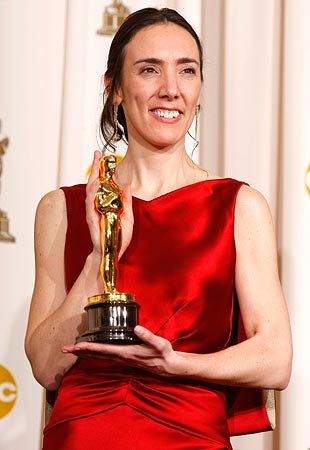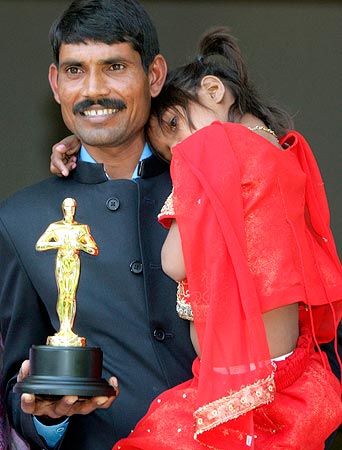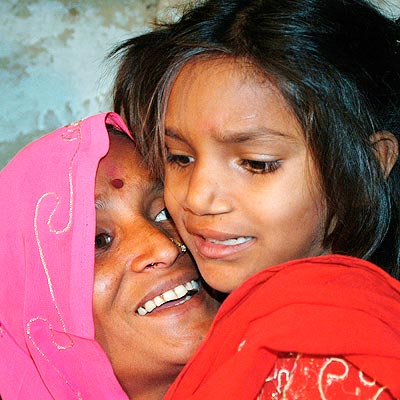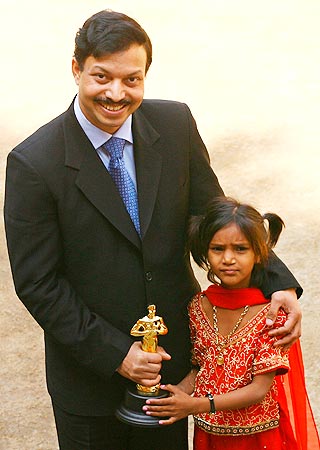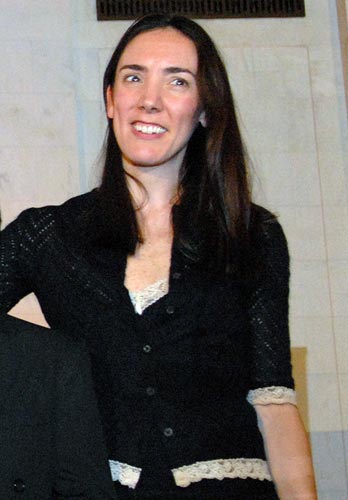 | « Back to article | Print this article |
Helping India win more than an Oscar
Megan Mylan's Oscar-winning documentary Smile Pinki is to be broadcast on HBO June 3. The New York-based filmmaker will also be showing it in over two dozen movie houses in America.
The film tells the story of Pinki, a five-year-old girl from a very poor family who had become a victim of ridicule and ostracism in her village in Uttar Pradesh because of her cleft lip. Helped by a social worker, she has free surgery.
The film also highlights the work of Dr Subodh Kumar Singh, who works for a global organisation Smile Train, which gives a new look each year to thousands of children across the world afflicted with cleft lip.
Singh recently said in an interview that Smile Pinki 'won just one Oscar; I have won many. In fact, I win every day. Whenever I treat a child and he goes back home smiling, I win an award.' He attended the Oscar ceremony along with Pinki Kumari and her father.
Here, Mylan discusses her Oscar-winning documentary film set in India.
What was it like winning the Oscar?
People may find it difficult to believe that I did not worry over winning the Oscar. The film had been shown at several film festivals and HBO was committed to showing it. I knew it would be going to more festivals. But I know now what a difference even the Oscar nomination does. And winning it makes a huge difference.
What kind of a difference are you talking about?
The walk on the red carpet and the worldwide publicity. I am sure that many more people would be watching it now on HBO because of the Oscars. The network will be showing it more than once, and that means it is going to help Smile Train and people like Dr Singh to do much more to help children like Pinki.
On a personal level, how has the Oscar affected you?
I have heard from friends and my teachers from school days who are in different parts of the world! My earlier films including Boys from Sudan have received good press and have been shown in many film festivals. Boys had a successful theatrical release in America. Now, there is a new interest in my past work.
You say that the Oscar for the film is an Oscar for India.
Absolutely. I am an American but this is the story of an Indian community. And my assistants in the film are Indian.
'All the time we were on the red carpet, she was looking at a blimp'
You have made films in America and Brazil. Would you like to make another documentary in India?
Certainly. I am also interested in working with Indian documentary-makers and give their films exposure in the West.
Tell us about bringing Pinki to Hollywood for the Oscar ceremony.
It was not an easy decision to make. We wondered if it was alright for this child, who still lives in a poor condition in a village, to be brought into the glittering world of Hollywood.
We debated over this for many days and finally decided to bring her along with her father and Dr Singh. We [the producers and the film team] said, why should we deny her this opportunity, something good may come out it, and her presence could give good publicity for other children worldwide to get help.
How did you prepare Pinky for her American sojourn?
Dr Singh and our small team in India took care of it. She had hardly travelled even in India, except travel a few hours to be in Banaras. Our team took her along with her father to New Delhi and she saw a big city for the first time.
What was her reaction on the red carpet?
We had a press conference in New York before she arrived in Los Angeles. So she had seen a bit of America before coming to Hollywood.
Was she at home on the red carpet?
We were on the red carpet for about 45 minutes. There were reporters and cameras. Many people wanted to interview us, and many did not want to. I thought it was amazing that Pinki was not overwhelmed. All the time we were on the red carpet, she was looking at a blimp!
What was her father's reaction?
He said everything was beautiful but there was too much of noise. He longed to go back to his village and be with his family.
And Pinky?
She also wanted to be back with her friends, siblings and mother. One evening we were walking by a row of beautiful bungalows in Hollywood. Dr Singh asked her if she would like to live in one of house houses some day. She told him, 'No, I want to live in the new house we are building in our village.'
'The film is also a tribute to Pinki's father'
Some people say this is a film about India rising. Yet, it is not a film about the rich and the upper middle class.
This film has a happy ending but it is also about the poverty that exists in many parts of India. I am not an expert on India. This was my first visit to the country. But I know that malnutrition and poverty hurt thousands of Indian women and these factors contribute to children being born with many problems including the cleft [lip].
What else does the film convey?
The absolute dedication of people like Dr Singh. The great work volunteer organisations do is to be highlighted. Dr Singh is able to perform these surgeries at a low cost. And see the difference he makes.
Like Pinki Kumar is a different person.
She was beautiful even with her cleft lip. She had bright eyes and a radiant smile. But she was being shunned by many people. The film is also a tribute to her father.
Why is that so?
He was determined to make a difference. He did not want his daughter to go through a lifetime of ostracism and ridicule. He was not sure if the surgery would work and I think he remained skeptical till the end. But his love for his daughter was so strong that he put faith in Dr Singh.
'Bill Gates is supporting many projects in India'
What does the film say to the affluent Indians in America, Canada and elsewhere?
I am sure that many Indians, especially in the Silicon Valley, are involved in projects in India that are helping the poor and the needy. Surely there are many projects to be supported. Bill Gates is supporting many projects in India. Silicon Valley Indian Americans can take inspiration from him and the likes of Dr Singh.
What do you admire most in Dr Singh?
His absolute dedication and the joy he gets from his work is an inspiration to anyone across the world. He could get a job anywhere in India that pays him five or eight times [more] than what he does.
Why is this film special to you?
Even before the Oscar nominations, I had been telling the people why this film has touched me deeply. I focus on social issues in my documentaries and that I get into a film knowing that we may not have a happy ending. Though Smile Pinki is very realistic, it still offers this uplifting story of a beautiful hospital and team of dedicated doctors.
'We have a lot more in common with other people and their problems than we had thought'
What is the universal appeal of this film?
I am always attracted to films that on the surface belong to a particular place but remind us in the end that we have a lot more in common with other people and their problems than we had thought.
And in the case of Smile Pinki?
It is the story of dedication and vision. It is also the story of love a father has for his daughter. And it is the story of hope. Stories such these have a universal chord. I have said this before: I continue to be inspired by the simple idea that the better we know each other, the better the world is. I hope people come out seeing my documentaries, especially Smile Pinki, feeling like they better understand the life of someone living a very different reality.
